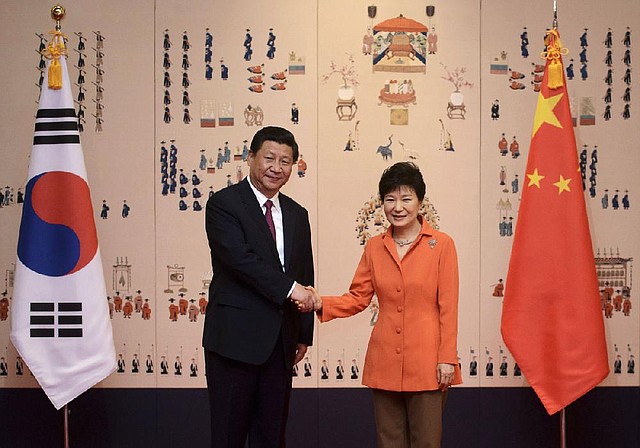S. Korea, China push to rid North of nukes
China's President Xi Jinping, left, and his South Korean counterpart Park Geun-hye shake hands prior to their summit meeting at the Blue House in Seoul Thursday, July 3, 2014. With a single meeting Thursday, the leaders of China and South Korea simultaneously snubbed North Korea, bolstered their already booming trade relationship and gave the U.S. and Japan a look at Beijing's growing influence south of the Korean Demilitarized Zone. (AP Photo/Ed Jones, Pool)
Friday, July 4, 2014
SEOUL, South Korea -- The leaders of China and South Korea sent a strong message Thursday to North Korea, saying they were united in their opposition to the development of nuclear weapons on the Korean Peninsula, but they fell short of announcing how they would pursue that goal.
After a three-hour meeting, China's president, Xi Jinping, and South Korea's leader, Park Geun-hye, issued a joint statement that smoothed over the differences in approach that have stalled a more aggressive stance toward the development of nuclear weapons by North Korea and its leader, Kim Jong Un, China's ally.
The leaders said in their joint comminque that the "two countries reaffirm their firm opposition to the development of nuclear weapons on the Korean peninsula."
With Xi standing beside her, Park read a statement that said the two leaders had agreed that the "denuclearization of North Korea must be achieved at all costs."
The variance in terminology -- with China insisting on calling for denuclearization of the whole peninsula -- showed the continued reluctance of China to single out the North Koreans and force them to give up their weapons for fear of creating instability that would spill over their borders, Chinese and South Korean analysts said.
Still, on the eve of Xi's arrival in Seoul, the South Korean foreign minister, Yun Byung-se, said the Chinese position could be interpreted as meaning the denuclearization of North Korea.
Park accompanied Xi and his wife, Peng Liyuan, to a formal welcoming ceremony and the signing of a visitors book Thursday in Seoul, and the two leaders stood together before the media after their meeting on a range of security, economic and cultural issues.But beneath the personal warmth lay long-standing disagreements on matters like how to get rid of North Korea's nuclear weapons program and, for Park, how to deal with Xi's new concept of a security architecture in Asia that would be led by China and sideline the United States.
"When you get into the sensitive political matters -- the denuclearization of North Korea and Xi Jinping's ideas for Asia -- it gets more difficult," said Chung-in Moon, professor of political science at Yonsei University in Seoul.
As expected, Xi called for the resumption of six-party talks that began in 2003 with the aim of ridding North Korea of its nuclear program but stopped in 2007.
In their joint statement, the two countries pledged to complete a free-trade agreement that would bolster their already booming economic ties. Xi said they hoped the accord would be completed within the year, and that annual two-way trade would increase to $300 billion by the end of 2014.
In something of a surprise, Xi said South Korea had agreed to consider joining the Chinese initiative for an Asian Infrastructure Investment Bank, which Beijing is organizing as a mechanism for a Chinese-led effort to bankroll more infrastructure projects in underdeveloped Asian nations.
The bank, still in the planning stage, is widely seen as an effort by China to create a funding structure to compete with the Asian Development Bank.
Park has insisted Japan should offer compensation to the victims of its military's use of Korean and other women as sex slaves during World War II. Similarly, China has a long list of grievances about Japanese atrocities before and during World War II, including the slaughter of tens of thousands of civilians in Nanjing in 1937.
"South Korea and China have been bonding on the history issues for a while," said John DeLury, professor of East Asian Studies at Yonsei University in Seoul.
A Section on 07/04/2014
